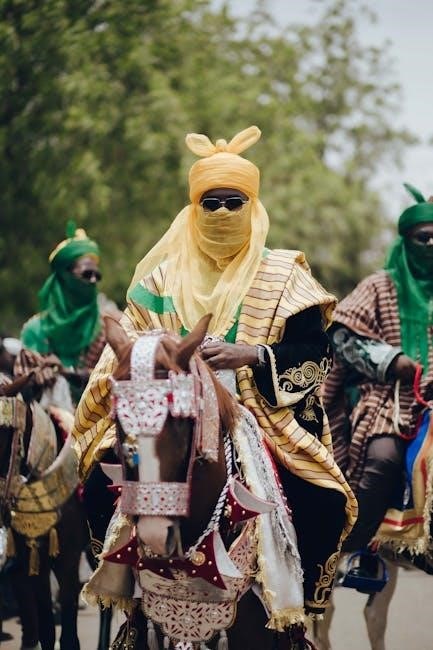Death and the King’s Horseman, a play by Wole Soyinka, explores the cultural clash between traditional Yoruba rituals and colonial interference in 1946 Nigeria. Based on real events, it follows Elesin Oba, the King’s Horseman, who must commit ritual suicide after the king’s death. However, British colonial officer Simon Pilkings intervenes, disrupting a sacred tradition and sparking a profound examination of cultural identity and duty;
Overview of the Play
Death and the King’s Horseman is a tragic play by Wole Soyinka, set in colonial Nigeria during 1946. The story revolves around Elesin Oba, the King’s Horseman, who is destined to commit ritual suicide to accompany his deceased king to the afterlife. However, his plans are disrupted by Simon Pilkings, a British colonial officer, who intervenes to prevent the ritual. This clash between tradition and modernity explores themes of cultural identity, duty, and the consequences of colonial interference in sacred rituals.
Historical Context and Setting
Death and the King’s Horseman is set in Oyo, Nigeria, during the colonial period in 1946. The play revolves around the death of a Yoruba king and the traditional ritual requiring his horseman, Elesin Oba, to follow him to the afterlife. The story reflects the cultural and colonial tensions of the time, as British colonial authorities, represented by Simon Pilkings, attempt to suppress ancient Yoruba traditions; This clash highlights the broader struggle between indigenous customs and colonial interference in post-World War II Nigeria.
Historical Background
Set in 1946 Oyo, Nigeria, Death and the King’s Horseman reflects the colonial clash over ritual suicide, a tradition questioned by British authorities.
The 1946 Events in Oyo, Nigeria
In 1946, Oyo, Nigeria, a significant cultural and political crisis unfolded. The King of Oyo had passed, and Elesin Oba, his loyal horseman, was expected to commit ritual suicide to escort his ruler to the afterlife. However, British colonial authorities, led by District Officer Simon Pilkings, intervened to prevent the ritual, sparking tension between traditional Yoruba customs and colonial rule. This historical incident inspired Wole Soyinkas play, highlighting the clash of cultures and the struggle to preserve ancestral traditions amidst external influence.
The Role of Elesin Oba and Ritual Suicide
Elesin Oba, the King’s Horseman, held a sacred duty to commit ritual suicide following the monarch’s death, ensuring the king’s safe passage to the afterlife. This tradition, deeply rooted in Yoruba culture, symbolized loyalty, honor, and spiritual continuity. Elesin’s failure to fulfill this obligation, due to colonial intervention, disrupted the metaphysical balance, leading to communal disgrace and cultural upheaval. Ritual suicide was not just a personal act but a collective responsibility, reflecting the Yoruba belief in the interconnectedness of life and death.
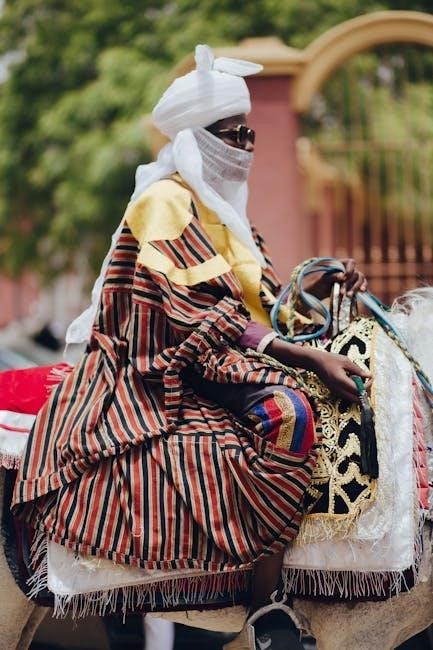
Cultural Significance
Death and the King’s Horseman highlights the clash between Yoruba traditions and colonial rule, blending cultural rituals with modernity. It explores themes of duty, honor, and the metaphysical balance, offering profound insights into Africa’s rich heritage and its resilience against external forces. The play underscores the importance of preserving cultural identity amidst colonial disruption, making it a cornerstone of African literature and theatrical expression.
Yoruba Traditions and Rituals
The play delves into the rich tapestry of Yoruba traditions, particularly the ritual of the king’s horseman, Elesin Oba, who must follow the deceased king to the afterlife. This sacred duty, steeped in centuries of Yoruba belief, ensures the king’s safe passage and maintains metaphysical balance. The rituals involve communal ceremonies, symbolic acts, and spiritual preparations, reflecting the Yoruba people’s deep connection to their ancestors and the divine. These customs are central to their identity, emphasizing honor, responsibility, and the continuity of cultural heritage.
The Metaphysical Balance in Yoruba Culture
Yoruba culture emphasizes a delicate metaphysical balance between the living, the dead, and the divine. This harmony is maintained through rituals and traditions, ensuring the ancestors’ continued influence and the community’s well-being. Elesin Oba’s duty to follow the king to the afterlife symbolizes this balance, as his failure disrupts the spiritual order. The play highlights how colonial interference, like Simon Pilkings’ intervention, destabilizes this sacred equilibrium, underscoring the interconnectedness of life, death, and the divine in Yoruba belief systems.
Main Characters and Their Roles
Elesin Oba, the King’s Horseman, is bound by tradition to follow the king to the afterlife, embodying duty and honor. Simon Pilkings, the colonial officer, represents modernity and interference, clashing with Elesin’s sacred mission.
Elesin Oba: The King’s Horseman
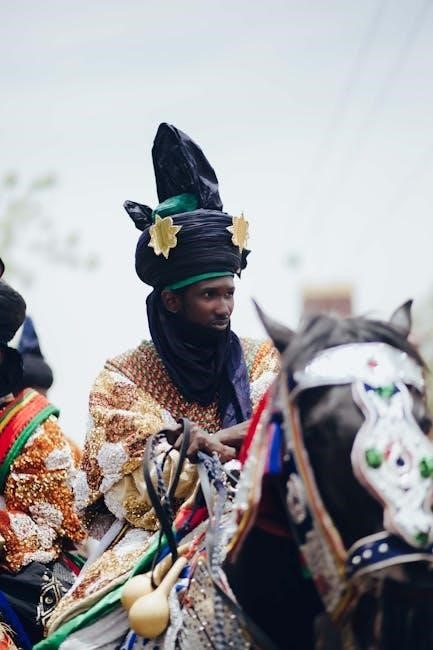
Elesin Oba, the King’s Horseman, is a central figure tasked with leading the deceased king to the afterlife through ritual suicide. Bound by Yoruba tradition, he embodies duty and honor, reflecting the community’s metaphysical beliefs. His role is sacred, ensuring the king’s safe passage and maintaining cosmic balance. However, his resolve is tested by colonial interference, leading to a tragic confrontation that underscores the clash between tradition and modernity, ultimately reshaping his fate and legacy. His story highlights the profundity of cultural obligation and personal sacrifice.
Simon Pilkings: The Colonial District Officer
Simon Pilkings, the colonial district officer, represents the imposing force of British colonial rule in Nigeria. His intervention to prevent Elesin Oba’s ritual suicide highlights the clash between colonial authority and Yoruba tradition. Pilkings’ actions stem from a mix of cultural ignorance and a misguided sense of moral superiority. His interference disrupts the sacred ritual, leading to tragic consequences and underscoring the tension between modernity and tradition. Pilkings’ character symbolizes the broader impact of colonialism on indigenous cultures and their sacred practices.
Themes and Motifs
The play explores themes of tradition vs. modernity, duty, honor, and cultural identity. These motifs highlight the clash between Yoruba rituals and colonial interference, emphasizing the struggle to preserve cultural heritage.
Tradition vs. Modernity
The play vividly portrays the clash between Yoruba traditions and colonial modernity. Elesin Obas ritual duty to follow the king to the afterlife represents the deeply rooted Yoruba belief system, while Simon Pilkings intervention embodies the imposition of Western values. This conflict highlights the tension between preserving cultural identity and embracing external influences. Soyinkas exploration of this dichotomy examines how colonialism disrupts traditional practices and the metaphysical balance upheld by the Yoruba people, leading to a tragic confrontation of cultural ideals and individual responsibility.
Duty, Responsibility, and Honor
Elesin Obas role as the King’s Horseman is deeply tied to duty, responsibility, and honor. His obligation to follow the king into the afterlife is not only a sacred ritual but also a personal commitment to his ancestors and community. The play underscores the weight of these principles in Yoruba culture, where failing to fulfill one’s duty is seen as a betrayal of both the king and the people. Soyinkas portrayal of Elesins internal conflict and ultimate failure questions the limits of individual will against cultural expectations and external forces.
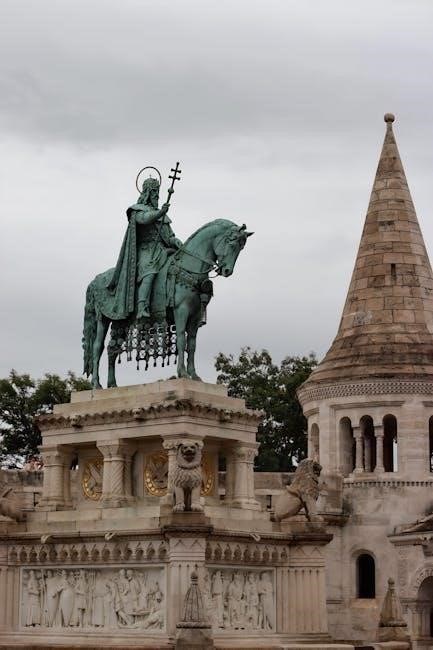
Theatrical Adaptations and Performances
Death and the King’s Horseman has seen notable stage productions, including Utopia Theatre’s 2023 adaptation at Sheffield’s Crucible, showcasing its cultural richness and enduring relevance to modern audiences.
Notable Productions and Their Impact
Death and the King’s Horseman has been adapted into powerful stage productions, such as the 2023 Sheffield Crucible staging by Utopia Theatre, marking a significant cultural milestone. These performances highlight the play’s universal themes, bridging traditional Yoruba rituals with modern audiences. The 2022 production in Nigeria further showcased its relevance, sparking discussions on cultural identity and colonial legacy. These adaptations underscore Soyinka’s work as a timeless exploration of tradition, duty, and cultural clashes, resonating deeply with global audiences.
Wole Soyinka’s Style and Influence
Wole Soyinka’s unique style blends traditional Yoruba elements with modern storytelling, creating a powerful exploration of cultural identity and colonial disruption. His work, a fusion of lyrical prose and dramatic intensity, has influenced global literature, earning him the Nobel Prize in Literature and solidifying his legacy as a literary giant.
Blending Traditional and Modern Elements
Wole Soyinka masterfully combines traditional Yoruba rituals and metaphysical beliefs with modern dramatic techniques in Death and the King’s Horseman. The play integrates Yoruba folklore, cultural symbolism, and spiritual practices, such as the role of Esu, the messenger deity, while employing contemporary storytelling to explore universal themes. This fusion creates a rich, layered narrative that bridges cultural divides, making the play both deeply rooted in Nigerian heritage and accessible to global audiences.
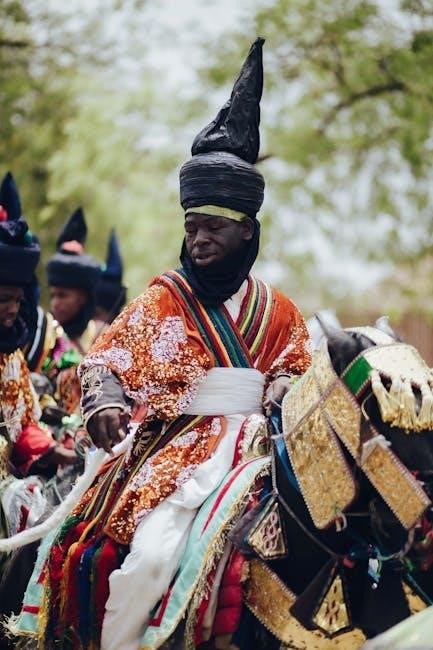
PDF Availability and Access
The play Death and the King’s Horseman is available as a downloadable PDF on platforms like archive.org and other online archives, ensuring easy access for readers worldwide.
Downloading the Play for Study
The PDF version of Death and the King’s Horseman is readily available for download on platforms such as archive.org and other online archives. This digital format allows readers to access the play conveniently for academic study and personal reading. The PDF ensures that the text is easily searchable and annotatable, making it ideal for in-depth analysis of Soyinka’s exploration of cultural conflict and tradition. Downloading the play provides a portable and accessible way to engage with its profound themes and historical context.

Critical Reception and Analysis

Death and the King’s Horseman has been praised for its profound exploration of cultural identity, duty, and colonial disruption. Scholars highlight its nuanced portrayal of Yoruba traditions and the tragic consequences of cultural clash, solidifying Soyinka’s reputation as a master of modern African literature. The play’s themes resonate deeply, making it a cornerstone of postcolonial studies and literary analysis.
Reviews and Scholarly Interpretations

Death and the King’s Horseman has garnered significant critical acclaim for its deep exploration of cultural tension, duty, and colonial disruption. Scholars praise Soyinka’s masterful storytelling, which delves into the complexities of tradition and modernity. The play is widely regarded as a cornerstone of postcolonial literature, offering profound insights into the clash of values during Nigeria’s colonial era. Its rich themes and historical context continue to inspire scholarly analysis, solidifying its place in global literary discourse.

Death and the King’s Horseman remains a timeless exploration of cultural identity, duty, and colonial disruption. Its enduring relevance bridges past and present, offering universal insights into humanity’s complex relationship with tradition and modernity, while serving as a powerful mirror to societal values and historical truths.
Reflection on the Play’s Enduring Relevance
Death and the King’s Horseman continues to resonate deeply, offering a poignant reflection on the clash between tradition and modernity. Its exploration of cultural identity, duty, and colonial disruption remains universally relevant, transcending time and geography. The play’s ability to provoke dialogue about honor, responsibility, and the metaphysical balance in Yoruba culture ensures its lasting impact. Soyinka’s masterpiece remains a vital work, bridging the past and present, and inspiring new interpretations and performances globally.
